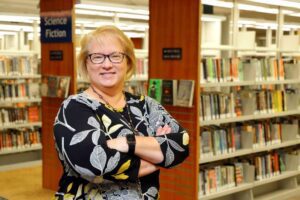by Amanda Milewski, photography by Nikola Tzenov
Book Reconsideration Process Sparks Debate in Carroll County Public Schools
The following 59 books were submitted to Carroll County Public Schools for reconsideration of inclusion in certain school media centers.
A Clash of Kings George R.R. Martin 2012 • A Court of Frost and Starlight Sarah J. Maas 2020 • A Court of Mist and Fury Sarah J. Maas 2020 • A Court of Silver Flame Sarah J. Maas 2022 • A Court of Thorns and Roses Sarah J. Maas 2020 • A Court of Wings and Ruin Sarah J. Maas 2020 • A Stolen Life Jaycee Dugard 2012 • All Boys Aren’t Blue George Johnson 2020 • All The Things We Do In The Dark Saundra Mitchell 2021 • And They Lived Steven Salvatore 2023 • Blankets Craig Thompson 2015 • Breathless Jennifer Niven 2022 • Damsel Elana K. Arnold 2018 • Deal With It Esther Drill 1999 • Doing It Hannah Witton 2018 • Empire of Storms Sarah J. Maas 2023 • Forever Judy Blume 2014 • Forever for a Year B.T. Gottfred 2016 • Half of a Yellow Sun Chimamanda Ngozi Adichie 2007 • Homegoing Yaa Gyasi 2017 • House of Earth and Blood Sarah J. Maas 2021 • House of Sky and Breath Sarah J. Maas 2023 • Identical Ellen Hopkins 2010 • It Ends With Us Colleen Hoover 2016 • Juliet Takes a Breath Gabby Rivera 2021 • Kingdom of Ash Sarah J. Maas 2023 • Last Night at the Telegraph Club Malinda Lo 2021 • Let’s Talk About It Erika Moen and Matthew Nolan 2021 • Like a Love Story Abdi Nazemian 2020 • Lucky Alice Sebold 1999 • Lighter Than My Shadow Katie Green 2017 • Looking for Alaska John Green 2005 • Man O’ War Cory McCarthy 2023 • Milk and Honey Rupi Kaur 2015 • Nineteen Minutes Jodi Picoult 2008 • Not that Bad: Dispatches from Rape Culture Roxanne Gay 2018 • November 9: A Novel Colleen Hoover 2015 • Oryx and Crake Margaret Atwood 2004 • People Kill People Ellen Hopkins 2019 • Perfect Ellen Hopkins 2013 • Red Hood Elana Arnold 2021 • Sex is a Funny Word Cory Silverberg and Fiona Smyth 2015 • Shine Lauren Myracle 2021 • Slaughterhouse Five Kurt Vonnegut 1973 • Sold Patricia McCormick 2008 • The Bluest Eye Toni Morrison 2004 • The Carnival at Bray Jesse Anne Foley 2014 • The DUFF Kody Keplinger 2011 • The Freedom Writers Diary: How a teacher and 150 teens used writing to change themselves and the world Erin Gruwell 1979 • The Handmaid’s Tale Margaret Atwood 1998 • The Haters Jesse Andrews 2017 • The Kite Runner Khaled Housieni 2013 • The Perks of Being a Wallflower Stephen Chbosky 2012 • The Sun and Her Flowers Rupi Kaur 2017 • Tilt Ellen Hopkins 2014 • Tricks Ellen Hopkins 2017 • Water for Elephants Sarah Gruen 2006 • What Girls Are Made Of Elena K. Arnold 2020 • Wicked: The Life and Times of the Wicked Witch of the West Gregory Maguire 2000
[divider style=”single” border=”small”]
In a community divided over parental rights and the freedom to read, Carroll County Public Schools (CCPS) finds itself at the center of a heated debate surrounding the removal of books from school library shelves before they undergo formal review. Last summer, the local chapter of Moms for Liberty initiated CCPS’s formal book reconsideration process, leading to a clash of opinions about the balance between parental concerns and academic freedom.
Jessica Garland, the vice chair of Carroll County Moms for Liberty, said she was taken aback by the public’s response to their requests to have books reviewed — this fall the list had reached 56 books on the review list. She emphasized that the goal of the review process is not to ban books but to ensure the protection of parental rights. “Just because a book is not in our school library does not mean it is banned,” she said.

– Jessica Garland, Moms for Liberty
Garland said her concern was sparked by an upheaval of parental rights during the COVID-19 pandemic. She perceived a loss of control over her children’s education and well-being, which she believes extended to the books available in school libraries. Garland contended that certain books may contribute to the mental health challenges faced by today’s youth.
“These books are another example of the latest social contagion that is fueling the mental health crises for our children’s generation,” Garland said. “It felt like another assault on my rights as a parent, except this time it was not about a virus, it was about exposing my children to illicit sexual content.”
Moms for Liberty relied on resources such as booklooks.org, commonsensemedia.org, and ratedbooks.org to identify books they wanted CCPS to reconsider. Their primary concern was books that contained explicit content. “Most of the books [under review] were not read by our members,” Garland acknowledged. She also argued that school media specialists do not read every title stocked in schools. “I do not have to see the whole movie to know the content is not appropriate for minors,” Garland said.
However, those critical of Moms for Liberty’s pile-up of reconsideration requests, including parents, educators and librarians, have raised concerns about censorship and its implications for students’ intellectual development. They argue that banning or restricting books may stifle curiosity and remove opportunities for a child to develop understanding of complex issues.
And data suggest that the removal of a book might have the opposite effect than intended, piquing a child’s or young adult’s curiosity about a targeted book. A survey of almost 2,000 library personnel conducted by EdWeek Research Center in spring 2023 found that students’ interest in restricted book titles increased by 33 percent. And 18 percent of students became more interested in reading in general after such an action. Locally, the Carroll County Public Library system reports that it saw waiting lists in the hundreds on some of the books that were removed from CCPS shelves.
Steve Wernick, CCPS director of curriculum and instruction, who oversees the school system’s media centers, emphasized the rigorous selection process in place for books. “Library/media specialists are expected to read the books prior to completing the Library Media Supplemental Material Verification Form,” he said. “The forms will be saved in the media center for as long as the material is available.”
Wernick noted that in addition to the form, the criterion that instructional and supplemental material not include sexually explicit content was added over the summer. Library media materials are supplemental, and the primary responsibility for their selection lies with each school’s media specialist. In addition to these criteria, each book also must have at least two positive reviews from standard book review sources such as Publisher’s Weekly, School Library Journal, and the Bulletin of the Center for Children’s Books.

CCPS’ book reconsideration process relies on a Reconsideration Committee that evaluates books and decides whether to keep them, remove them, or restrict them to certain grade levels. It is expected to review books in their entirety, considering their context.
The Reconsideration Committee is a standing panel appointed for a two-year term by the superintendent of schools. It is made up of two school media specialists, two school-based administrators, one instructional supervisor, one teacher (at the appropriate level for the material in question), three parents and three high school students. The committee is chaired by the supervisor of library media, who is a nonvoting member.
In addition to reading the book(s) being evaluated and testimony from those requesting the reconsideration, the committee may also “hear statements from the supervisor of the curriculum area involved; the principal of the school; and the media specialist/teacher of the school from which the request originated,” as noted in the CCPS manual Selection, Evaluation, and Adoption of Instructional Materials.
The CCPS manual, which includes guidelines for the reconsideration process, stipulates that the committee will meet within 30 days of receiving the request for consideration and that the committee’s decision will be reported in writing within 10 school days after completing their review.
Wernick explained that, because of the number of books under reconsideration, the committee is reading and reviewing five books at a time. As of mid-November, decisions had been made for about 15 books, with the committee recommending two of the books be removed from library shelves (Water for Elephants and A Court of Thorns and Roses).
According to the CCPS manual, the Reconsideration Committee’s decision may be appealed to the Superintendent within 10 school days of the date of the Committee’s written response. The Superintendent or designee will render a written decision to the appellant and the Reconsideration Committee within 30 school days of receiving the appeal.
Superintendent Cynthia McCabe appointed Assistant Superintendent of Instruction Nicholas Shockney to hear appeals. Appeals were filed for each of the books that the committee determined should stay on school library shelves. After hearing appeals, Shockney removed a third book from shelves and added “parental permission” requirements to four books.
According to the manual, once a formal request for reconsideration has been made, the principal of the school from which the request originated “may make a written request to the director of curriculum and instruction to remove the material from that school’s media collection during the reconsideration process.”
This summer, McCabe made the decision to remove the books from circulation before they had been reviewed. According to Wernick, the decision was made to ensure a smooth start to the school year and accommodate the influx of reconsidered books. “We are now in an unprecedented time with the many books under reconsideration,” Wernick said.
Critics argue that removing books from shelves before they are reviewed limits students’ access to diverse perspectives and ideas, undermining the role of school librarians in curating collections. Organizations such as the Maryland Association of School Librarians and the Maryland Library Association have publicly criticized the removal of books before the formal reconsideration process is completed.
In an open letter to McCabe and school board members, the Maryland Association of School Librarians, the Maryland Library Association, and the Citizens for Maryland Libraries, criticized the decision to remove books from the shelves prior to any of them undergoing the reconsideration process. The letter stated: “This administrative decision undermines best practices set forth by the American Library Association and the American Association of School Librarians. While removal of books is not in direct violation of the Carroll County policy and procedure, it does censor and limit the ability of students to have access to these titles.”

“School librarians are experts in collection development and have been trained in how to select books that provide a wide range of topics and ideas that engage, inspire, and allow students to explore the world through books,” the organizations further noted in the letter. “School library books are choice reading. No students are forced to read anything in the school library. We teach them the life skills of selection, and how to meet their unique needs for reading. Students must have choice in their selection of books so that they may learn these important life skills.”
The Carroll County Public Library system has also been outspoken on the issue, pledging to incorporate any title removed from the shelves of CCPS libraries into its own collection.
“A crucial aspect of a librarian’s work is the safeguarding of this freedom of speech, the free press, and to foster true civil discourse,” Andrea Berstler, executive director of the Carroll County Public Library, said in a public statement that can be seen on the CCPL website. “This encompasses the freedom to hear spoken words and read written ones. Censorship stifles civilizations, limits potential and hinders professional growth.”
In the statement, Berstler voices support for the important work that librarians do, and agrees that parents should choose what is suitable for their own children to read.
“Carroll County Public Library staunchly supports the tireless efforts of library staff to ensure access to information free from the specter of retribution. We endorse the belief that parents should choose what is suitable for their own child to read and that librarians are uniquely qualified to curate collections that reflect diversity and inclusivity designed to meet the needs of all members of our community. These two principles can and should coexist harmoniously.”
As the debate rages on, the community remains divided, with one side arguing for parental rights, while the other emphasizes the importance of access to diverse ideas and perspectives in education. As CCPS grapples with finding a balance between protecting parental rights and fostering an inclusive and open educational environment, there are dozens of books unavailable to students as they await their formal review by the Reconsideration Committee.
Want updates on book reconsideration results? According to the CCPS Communications Office, you’ll have to email publicinfo@carrollk12.org and make a request for information. Kym Byrnes contributed to this article.
[/vc_column_text][/vc_column][/vc_row]













